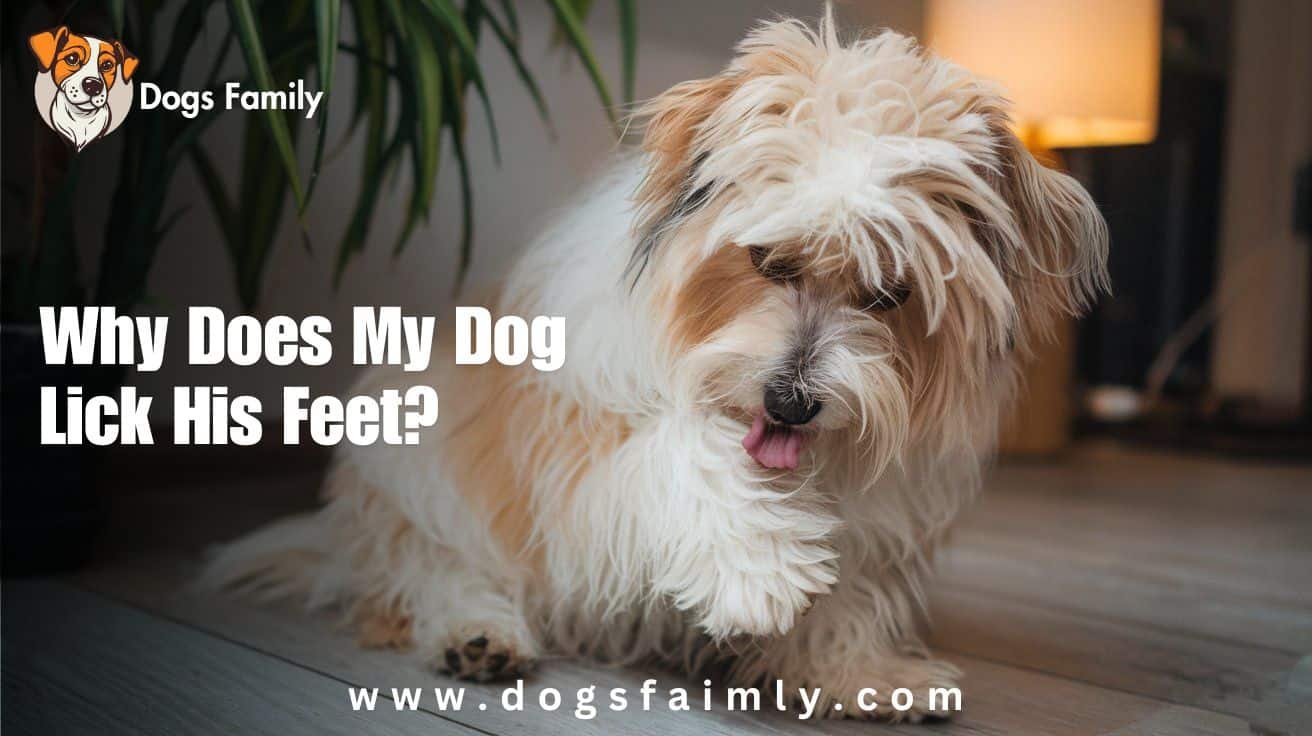Introduction
As a dog owner, you may have noticed your furry friend engaging in the peculiar habit of licking his feet. While this behavior might seem harmless at first, it can leave many dog owners wondering, “Why Does My Dog Lick His Feet?” Understanding this behavior can help you identify any potential issues and improve your dog’s overall well-being. In this article, we’ll explore the various reasons behind this behavior, share anecdotes, and provide guidance on how to address it if necessary.
Common Reasons for Why Does My Dog Lick His Feet?
Why Does My Dog Lick His Feet? Dogs lick their feet for various reasons, and not all of them indicate a serious problem. Here are some of the most common reasons:
1. Allergies
One of the most frequent causes of excessive licking is allergies. Just like humans, dogs can be allergic to various substances, including pollen, dust mites, and certain foods. If your dog licks his feet, it could be a sign of an allergic reaction.
Anecdote: I remember when my friend’s Golden Retriever, Max, began licking his paws excessively. Initially, she thought it was just a quirky habit. However, after consulting with her vet, she discovered that Max was allergic to certain types of grass. By changing his diet and cleaning his paws after walks, she significantly reduced his foot licking.
2. Boredom or Anxiety
Dogs are intelligent animals, and they can easily become bored if they don’t have enough mental or physical stimulation. In some cases, foot licking can be a sign of boredom or anxiety. If your dog is home alone for long periods or lacks enough exercise, he may resort to licking as a way to cope.
3. Injuries or Irritation
If your dog has an injury, cut, or irritation on his paw, he may lick it in an attempt to soothe himself. It’s essential to check his feet regularly for any signs of injury, such as redness, swelling, or foreign objects stuck between his toes.
4. Skin Conditions
Various skin conditions can lead to itching and discomfort, prompting your dog to lick his feet. Conditions such as dermatitis, fungal infections, or hot spots may cause your dog to seek relief through licking.
5. Habit
Sometimes, licking can simply become a habit. If your dog has been licking his feet for a long time, it may turn into a compulsive behavior. This is similar to humans who bite their nails when nervous.
When Should You Be Concerned?
While occasional licking is normal, excessive licking can lead to skin irritation and infections. Here are some signs that may indicate a more serious issue:
- Redness or Swelling: If you notice inflammation, redness, or swelling on your dog’s paws, it could indicate an underlying problem.
- Foul Odor: A strong smell coming from your dog’s feet may suggest a fungal infection or another health issue.
- Discharge: If you see any discharge from your dog’s paws, it’s essential to consult a veterinarian.
- Behavior Changes: If your dog becomes more irritable or withdrawn, it may indicate that he is uncomfortable.
What to Do About Excessive Foot Licking
If you’ve determined that your dog’s foot licking is excessive and may require intervention, here’s a step-by-step guide to address the issue:
Step 1: Observe and Document
Take note of when and how often your dog licks his feet. Does it happen more after certain activities, like walks or playtime? Documenting these patterns can help your veterinarian identify the underlying cause.
Step 2: Check for Allergies
If you suspect allergies may be causing your dog’s licking, consider the following:
- Dietary Changes: Consult your vet about an elimination diet to identify any food allergies. You might want to try a limited-ingredient diet or grain-free options to see if it makes a difference.
- Environmental Allergens: Make sure to wipe your dog’s paws after walks to remove pollen or irritants. You can use dog-friendly wipes or a damp cloth.
Step 3: Increase Stimulation
If boredom is a factor, increase your dog’s mental and physical stimulation. Here are some suggestions:
- Regular Exercise: Ensure your dog is getting enough exercise through daily walks, playtime, and trips to the dog park.
- Interactive Toys: Invest in puzzle toys that challenge your dog mentally and keep him engaged.
Step 4: Visit the Veterinarian
If your dog’s licking persists despite your efforts, it’s crucial to consult your veterinarian. They can perform a thorough examination, conduct tests if necessary, and recommend appropriate treatments. Treatment options may include medications, topical ointments, or changes in diet.
Step 5: Consider Training
If your dog’s licking has turned into a compulsive habit, behavioral training may be beneficial. A professional dog trainer can provide guidance and techniques to redirect this behavior.
Products That Can Help
If your dog’s foot licking is linked to allergies or skin irritations, several products can help:
- Dog Wipes: Use pet wipes to clean your dog’s paws after outdoor activities to remove irritants.
- Allergy Supplements: Consider adding allergy supplements to your dog’s diet to support skin health.
- Topical Treatments: Consult your vet for effective topical treatments to soothe irritated skin.
Conclusion
Why Does My Dog Lick His Feet, In conclusion, while it’s not uncommon for dogs to lick their feet, excessive licking can signal underlying issues that may require attention. By understanding the reasons behind this behavior and observing your dog closely, you can identify potential problems early on.
Why Does My Dog Lick His Feet? If you notice persistent licking accompanied by signs of discomfort, don’t hesitate to consult your veterinarian. With the right care and attention, you can ensure your furry friend lives a happy and healthy life, free from unnecessary foot licking.
Remember, your dog relies on you to keep him comfortable and happy, so take the time to understand his needs!
Hyperlinks:
My Dog Keeps Licking His Lips And Swallowing
Why is My Dog Throwing Up White Foam?
Should I let my dog lick his feet?
Allowing your dog to lick his feet occasionally is generally normal behavior; however, excessive licking should be monitored. While licking can help clean his paws, frequent or obsessive licking may indicate underlying issues, such as allergies, irritation, or boredom. If you notice your dog licking his feet excessively, it's best to investigate further. Check for signs of injury or irritation, and consult your veterinarian if the behavior continues. Providing mental stimulation and regular grooming can also help minimize excessive licking and keep your dog comfortable and healthy. Always prioritize your dog's well-being and address any concerning behavior.
Is it normal to let a dog lick your feet?
Does dog licking paws mean allergies?
Yes, dog paw licking can indicate allergies, but it’s not always the case. If a dog is licking his paws excessively, it may be a sign of environmental allergies, such as pollen, dust mites, or certain materials. Allergies can cause itching and discomfort, prompting dogs to lick their paws for relief. However, other issues like injuries, irritations, boredom, or anxiety can also lead to this behavior. If your dog’s paw licking is persistent, it’s advisable to consult a veterinarian for a proper diagnosis and treatment plan to address any underlying causes, including allergies.
How do you treat a dog's licking paws?
To treat a dog's paw licking, start by identifying the underlying cause. Regularly inspect your dog’s paws for injuries, irritations, or foreign objects. If allergies are suspected, consult your veterinarian for allergy testing and potential dietary changes. Topical treatments or anti-itch sprays can soothe irritated skin. Bathing your dog with hypoallergenic shampoos may also help. Increase mental and physical stimulation to reduce boredom-related licking. If licking persists, your vet may recommend medications, such as antihistamines or corticosteroids. Regular grooming and cleaning your dog's paws after walks can also help prevent irritation and reduce licking behavior.

